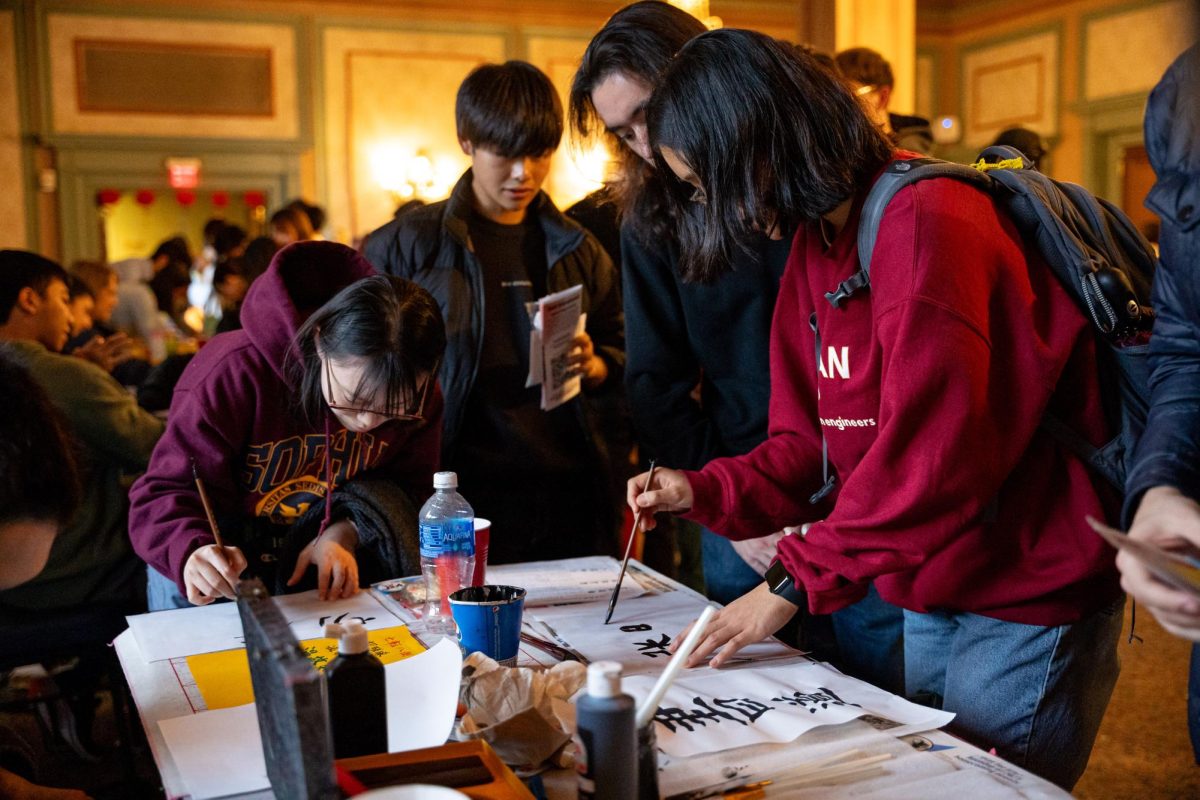In a tranquil corner of the William Pitt Union beneath the decor of glowing red lanterns, melodies from the Studio Ghibli film “Spirited Away” wafted through the air, drawing together a captivating tapestry of Japanese culture that unites more than a hundred students from the University of Pittsburgh and visiting guests.
On the evening of Sunday, Oct. 15, an enthusiastic assembly converged to partake in the festivities of Bunkasai, an event hosted by the Japanese Student Association (JSA). The enchanting “Spirited Away” theme of the event piqued the curiosity of passersby, resulting in an overflowing Assembly Room within the WPU.
Maya Iwabuchi, president of the JSA and a senior computer science major, said Bunkasai is a cultural celebration made by and for students. Iwabuchi said the JSA organized Bunkasai at Pitt to celebrate the diversity of the club.
“Bunkasai is an event inspired by traditional culture fairs in Japan, ‘bunka’ means culture and ‘sai’ is a celebration, so it’s a celebration of student life and student culture,” Iwabuchi said. “When we say culture, it’s not specifically Japanese culture, in this context it’s a celebration of student culture and the diversity that our club holds. We have both native Japanese club members and others from all different backgrounds, and we like to celebrate that.”
Iwabuchi explained that the JSA took the traditional cultural celebrations of Bunkasai in Japan and converted them into celebrations that fit the community at Pitt. Iwabuchi said the JSA made sure to incorporate traditional elements of Bunkasai in their take on the celebration.
“Traditional culture fairs in Japan will have students getting together to make an offering or showcase in each classroom and people can tour each class as a different event,” Iwabuchi said. “We decided to emulate that by having booths at our events with games, food, crafts and prizes. In addition to that we’re bringing performances of Bunkasai to Pitt.”
Megumi Barclay, a sophomore English non-fiction writing major that serves as both social media chair and public relations co-chair for JSA, said JSA has undergone a transformative evolution as a student organization. Barclay said the JSA is not just for Japanese-speaking students — it’s an organization for all Pitt students interested in Japanese culture.
“A lot of people who are not Japanese joined the committee this year, which we haven’t had in the past years,” Barclay said. “We have a lot of people that joined because they’re interested and I think that’s going to help bridge the gap between people feeling like they have to be Japanese to join.”
Serena Arnold, a sophomore biological sciences major and the events coordinator for JSA, spoke of her personal experience joining the JSA and becoming a part of a larger community. Arnold said joining the JSA led her to have a group of supportive friends who understand her cultural background.
“I never knew people my age who had the same cultural experience, so as soon as I heard about JSA at Pitt, I joined,” Arnold said. “I like the fact that we can speak the same second language and we can talk to each other about similar Japanese cartoons we watched growing up or our Japanese cuisine.”
Arnold said she enjoyed working on Bunkasai because it brings together all Asian Student Associations and not just JSA. Arnold said the booths at the celebration were a fusion of different Asian cultures.
“One part that is special about Bunkasai is that we’re able to bring in performances of people from Pitt’s JSA, CMU’s [Carnegie Mellon’s] JSA, and we also have tabling from all of the other member organizations of the ASA,” Arnold said. “It’s a nice way for all of the ASA sub-organizations to get together and celebrate one of the main events that schools have in Japan.”
Barclay, like Arnold, discussed her appreciation for the JSA. Barclay said the JSA is not just a club — it’s a significant part of her life where she finds a lot of support.
“I love JSA and I consider it one of the pillars in my life,” Barclay said. “It’s been so integral, we’ve been working very well together as a team of board members and the committee.”
Iwabuchi emphasized the larger purpose of hosting Bunkasai is to bring Japanese culture into Pittsburgh and to create a home away from home for Japanese students.
“A little Japan in Pittsburgh is really what we’re trying to bring to the Pitt student body, we’re trying to bring a taste of what we call home,” Iwabuchi said. “We want to bring the love that we have for our culture to the community. We try to bring one big event every semester to do that.”
Barclay also discussed bigger JSA events to welcome a larger community of people. Barclay said the JSA hosts another large event during the spring semester called Matsuri, and she strongly urges people to attend.
“Matsuri is in the spring. It’s essentially like Bunkasai but on a smaller scale, a lot of families come, which is very cute — it’s nice to see the younger Japanese community,” Barclay said. “If you are interested in Japanese culture and want to learn more, or if you just want to find a space where you are supported then definitely come out!”


